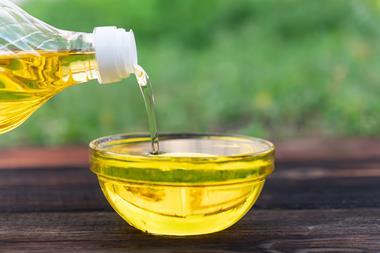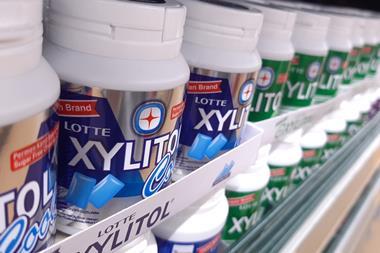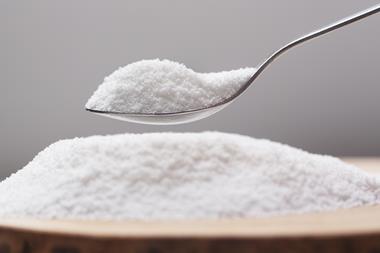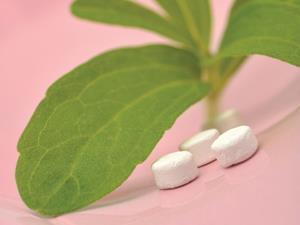In recent years, non-sugar sweeteners – often referred to as artificial, low-calorie or non-nutritive sweeteners – have been regularly making the headlines. However, it was rarely for positive reasons.
In March, a US study found that people with higher levels of erythritol in their blood had a notably higher risk of cardiovascular problems and in June, in vivo studies revealed that sucralose could be metabolised in the gut to form a compound that damages DNA.
Most recently, the International Agency for Research on Cancer (IARC) classified aspartame – a non-sugar sweetener widely used since the 1980s in products including diet drinks and chewing gum – as ‘possibly carcinogenic’ to humans. The grouping – which also includes the likes of pickled vegetables, caffeine and aloe vera – means that there is ‘limited evidence’ in humans and ‘less than sufficient evidence’ in experimental animals that aspartame is carcinogenic.
Alongside the IARC classification, the joint Food and Agriculture Organization/World Health Organization (WHO) expert committee on food additives completed an updated risk assessment of aspartame. It concluded that there was no reason to change the previously established acceptable daily intake (ADI) of up to 40mg/kg body weight for aspartame.
However, the messaging around aspartame’s classification as ‘possibly carcinogenic’ and conflicting messages around other non-sugar sweeteners has left many people confused about the actual risks.
‘Sweeteners are often in the headlines and so it’s understandable that people may be concerned about their safety,’ says Bridget Benelam, a nutrition scientist at the British Nutrition Foundation. ‘However, it’s always important to look at the evidence for health benefits or harms as a whole, not just single studies that may feature in the media.’
‘We haven’t communicated risks and hazards very well,’ says Duane Mellor, a registered dietician and senior teaching fellow at Aston Medical School. ‘Having something that’s a potential hazard doesn’t mean it’s a risk. Yes, a hazard means, theoretically, there might be a slight problem with it, but the risk is how much of an issue it is.’
The problem with sweeteners
All of the sweeteners on the market have been risk assessed by regulatory agencies such as the European Food Safety Authority (EFSA) or US Food and Drug Administration (FDA), who set ADIs and maximum limits for additives in foods and drinks. Benelam says that food safety agencies regularly assess new evidence as understanding of topics like the gut microbiome improves.
Gunter Kuhnle, an expert in nutrition and food science at the University of Reading, says that there are two sources of data that suggest that sweeteners are associated with harm, both of which have limitations. The first is animal studies, which, he says, either use very high amounts of sweeteners –beyond what most people would consume – or have key methodological problems.
‘A very common issue I see is that if you look at gut microbiome studies, and you use rodents, one key difference between us and rodents is that rodents eat their own poop. We tend not to do that, so… the microbiome is very different. They are rodents, they have a different diet,’ he explains.
The other source of data is observational studies, such as the NutriNet-Santé study, a large cohort study published in 2022 that suggested that artificial sweeteners, particularly aspartame and acesulfame-K, were associated with increased cancer risk.
However, observational studies can only show an association between sweeteners and a health outcome, rather than clinical trials which are better at proving a causal link. Consequently, these sorts of studies cannot separate out the effect of sweeteners from the other, often behavioural, factors at play.
‘The main exposure people have to sweeteners is often in diet soft drinks,’ says Kulne. ‘People who consume diet products are either more likely to be obese or have diabetes or are more prone to be because of other factors which are very difficult to take apart.’
Long-term use
The consumption of artificial sweeteners, particularly in drinks, is still on the rise as more people try to reduce their sugar consumption and cut calories. A 2022 study that analysed trends in per capita quantities of added sugars and non-nutritive sweeteners sold in drinks between 2007 and 2019 found that, globally, sales of drinks with added sugars fell by 12% while sales of drinks with non-nutritive sweeteners increased by 36%.
However, in May, the WHO published new guidance on the use of non-sugar sweeteners in which it advised against their use as a means of achieving weight control or reducing the risk of noncommunicable disease.
‘This was based on a systematic review that showed a lack of benefit from using non-sugar sweeteners for weight control alongside potential negative effects from long-term use, such as an increased risk of type 2 diabetes, cardiovascular diseases and mortality in adults,’ says Benelam. ‘The recommendation was classed as “conditional” because of uncertainty over the balance of risk versus benefits of non-sugar sweeteners, and it is based on evidence that WHO classified as “low certainty” overall,’ she adds.
The WHO guidance created a lot of discussion among health scientists, much of it critical. Some experts highlighted that the review did not consider the impact of replacing sugar-sweetened drinks with artificially-sweetened drinks and that there was evidence supporting the role of non-sugar sweeteners as a way for people wanting to lose weight to reduce calories in the short-term.
‘Relying on the sweetness is not helpful, but if it enables you to make better dietary choices [that] can help you,’ says Mellor. ‘If [the choice] is individualised, made by a consumer who’s choosing a healthy diet and that’s the way they get their sweet flavours occasionally, yes, that can be useful. But generally, they’re not put into a food system in that way,’ he adds.
For Kuhnle, sweeteners are very beneficial for people wanting to reduce sugar intake. ‘For a lot of people, a huge source of sugar intake is our soft drinks, so removing this and replacing it with sweeteners is definitely a sensible thing; you reduce the risk of obesity and other diseases.’
Changing the dialogue
A lot of work has been done in the UK, particularly with drinks, to replace some or all sugars with sweeteners. The introduction of the Soft Drinks Industry Levy or ‘sugar tax’ in April 2018, was part of those efforts to nudge people to lower their sugar intake. And while figures suggest the sugar tax has had an impact – with estimates suggesting it is responsible for a total reduction of 5.9 billion calories per week from soft drinks consumption alone – the latest influx of information on sweeteners has left many people unsure of what advice to follow.
Mellor thinks this confusion could have one of two outcomes. ‘Some people are just going to stop using [artificial sweeteners] and go back to sugar which is not healthy. Some people will just ignore it and not trust any of the science.’
The issue has highlighted the need for an open and honest conversation around sweeteners: ultimately the healthiest choice would be to only drink water but for many, this is not a realistic option.
‘In theory it may be ideal for people to change their dietary habits completely, for example to swap all sugary drinks for water and to change sweet foods for fruit, but we know it’s really difficult to make big changes to people’s behaviour happen in practice,’ says Benelam. ‘So, giving people the option to swap to foods and drinks with less sugar, but still with a sweet taste, is one way that people can choose to reduce sugar and calorie intakes.’
Mellor says there is a need for a ‘more carefully worded debate’ on how sweeteners can be used as a ‘tool’ to follow a healthier diet. ‘If we want people to be healthier through their diet, we need to engage them into making healthier food choices; we tend to be offered the most tasty, palatable food with a low price rather than being supported to eat … some of the simpler, healthier foods which people around the world have been eating for centuries,’ he adds.
Mellor says that sweeteners can have a place for people who have an overall healthy diet, containing a variety of vegetables, fruits, seeds, beans and lentils. ‘Rather than saying, “I’m just switching all my sugars to sweeteners” and not really thinking about the food you consume, if you’re actively making healthy choices and having some of these for that little bit of a sugary pleasure flavour, that’s less of an issue.’

















2 readers' comments